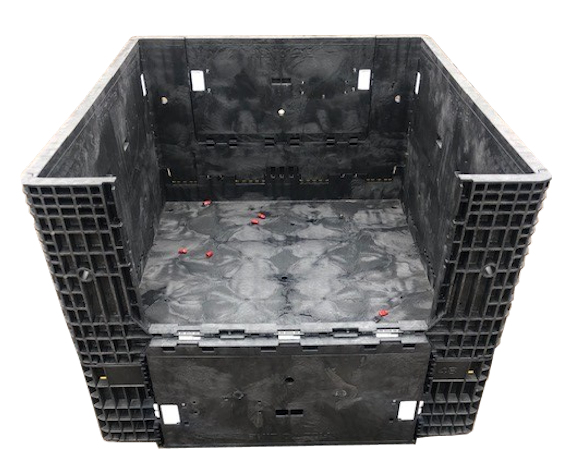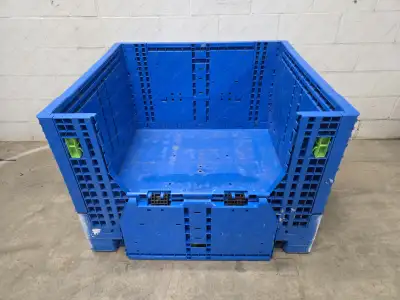The growing demand for used collapsible containers in warehousing sectors
Exactly How Mass Containers Can Improve Effectiveness in Your Product Packaging Workflow
Mass containers play an essential role in optimizing packaging operations. Their design makes it possible for better use upright room and promotes arranged supply administration. This efficiency brings about decreased material replenishment frequency and lower labor expenses. Furthermore, the toughness of these containers decreases item damage. As businesses look for ways to boost their procedures, understanding the diverse benefits of bulk containers comes to be crucial. What other benefits might they give the table?
Streamlined Storage Space Solutions
As firms seek to optimize their operations, structured storage space remedies have come to be essential for boosting packaging efficiency. Reliable storage space not just saves area but likewise helps with quicker accessibility to materials, which is important in hectic manufacturing environments. Bulk containers, developed for simple piling and company, significantly minimize the intricacy of storage systems. They permit businesses to optimize vertical room while lessening the footprint needed for supply.
In addition, these containers usually include ergonomic layouts that simplify managing and transportation, reducing the danger of injury and boosting operations. By consolidating products wholesale containers, business can reduce the frequency of restocking and enhance their supply chain procedures. In general, the application of reliable storage space options fosters a much more organized work area, leading to enhanced efficiency and decreased operational prices. With thoughtful design and calculated use bulk containers, businesses can achieve notable improvements in their product packaging procedures.

Waste Decrease and Sustainability
While the search of performance often drives packaging decisions, waste reduction and sustainability have actually arised as essential considerations in modern procedures. Companies increasingly acknowledge that adopting mass containers can considerably reduce product waste. These containers frequently utilize less product packaging material than conventional methods, resulting in a smaller carbon footprint.
Moreover, mass containers can be recycled numerous times, which better reduces the need for single-use product packaging and decreases overall waste entering land fills. Their design usually permits for much easier recycling procedures, aligning with sustainability goals.
Additionally, business that prioritize waste reduction can boost their brand name reputation, attracting environmentally conscious customers. By executing bulk containers, businesses not only streamline procedures but additionally contribute positively to environmental stewardship. This double advantage of functional effectiveness and sustainability settings business positively in an open market progressively focused on environment-friendly methods.
Improved Setting Up Line Efficiency

Implementing mass containers on assembly lines considerably enhances effectiveness by enhancing the handling and transport of products. By making use of mass containers, suppliers can reduce the frequency of product replenishment, enabling workers to concentrate on assembly tasks as opposed to constant stock monitoring. This results in less disruptions and a smoother operations, eventually boosting efficiency.
Additionally, bulk containers are designed for simple assimilation with automated systems, further enhancing the assembly procedure. Their standard dimensions and shapes help with better company, allowing employees to situate and gain access to products quickly. This reduction in search time adds to an extra fluid production environment.

Cost Savings and Improved Earnings Margins
Significant cost financial savings can be recognized with the fostering of mass containers in product packaging procedures. By lowering the requirement for multiple smaller sized plans, companies can reduce product prices notably. Bulk containers often require much less product packaging product overall, resulting in lower expenditures on products. In addition, the performance of mass handling minimizes labor costs connected with packaging and unpacking, further enhancing savings.
Less journeys to suppliers and lowered transportation costs are also essential advantages, as mass containers allow for increased item ability per delivery. This greater quantity not just reduces shipping costs however additionally optimizes storage space within centers, causing enhanced stock management.
Moreover, the resilience of bulk containers commonly equates to lower damages prices throughout handling and transportation, preserving item honesty and minimizing waste. Collectively, these elements contribute to better profit margins, making bulk containers a financially helpful option for businesses looking for effectiveness in their packaging procedures.
Versatility Throughout Industries
Mass containers supply exceptional flexibility across various industries, making them a beneficial possession past simply set you back financial savings. In the food and drink industry, these containers facilitate the risk-free transportation and storage of huge quantities of components, boosting effectiveness in assembly line. In drugs, mass containers assure compliance with rigorous hygiene requirements while fitting the mass handling of basic materials. The chemical market additionally benefits, as these containers hold up against extreme compounds and avoid contamination, supporting risk-free procedures. used collapsible bulk containers. Additionally, the farming field uses bulk containers for carrying grains and plant foods, optimizing logistics and lowering waste. Their adaptability encompasses manufacturing, where mass containers enhance setting up procedures and decrease the demand for excessive product packaging. This website cross-industry functionality not only boosts functional performance but additionally advertises sustainability with decreased product packaging waste, showing the important function mass containers play in modern-day supply chains
Regularly Asked Inquiries
Just How Do Mass Containers Effect Worker Safety in Packaging Operations?
Mass containers considerably boost employee security in packaging procedures by reducing manual handling, minimizing injury dangers, and promoting ergonomic techniques. Their layout helps with much safer transport and storage, eventually producing a more protected work atmosphere for all staff members.
What Materials Are Mass Containers Normally Made From?
Bulk containers are commonly made from resilient products such as high-density polyethylene, polypropylene, timber, or metal - refurbished bulk containers. These products offer strength, resistance to environmental variables, and suitability for different materials, ensuring secure and reliable transport of goods
Can Bulk Containers Be Custom-made for Certain Products?
Yes, bulk containers can be customized for particular items. Manufacturers often customize dimensions, products, and features to satisfy one-of-a-kind requirements, making sure excellent protection and effectiveness throughout storage space and transport of various items.
Exactly How Do Bulk Containers Affect Transportation Logistics?
Bulk containers streamline transport logistics by taking full advantage of cargo room, reducing the number of trips needed, and minimizing managing expenses (refurbished bulk containers). Their standardized dimensions assist in reliable dumping and filling, eventually leading to boosted functional effectiveness throughout the supply chain
What Is the Life Expectancy of Mass Containers in Normal Use?
The lifespan of bulk containers in normal usage normally varies from 5 to ten years, depending upon material quality, dealing with techniques, and ecological problems. Proper maintenance can considerably expand their functionality and performance.
Implementing mass containers on assembly lines significantly enhances effectiveness by streamlining the handling and transport of products. Bulk containers usually call for less product packaging product on the whole, resulting in lower expenditures on supplies. In pharmaceuticals, bulk containers guarantee compliance with rigid hygiene requirements while fitting the bulk handling of raw products. Their versatility extends to manufacturing, where bulk containers enhance assembly processes and decrease the demand for too much packaging. Mass containers substantially boost worker security in product packaging procedures by minimizing hand-operated handling, lessening injury dangers, and promoting ergonomic practices.